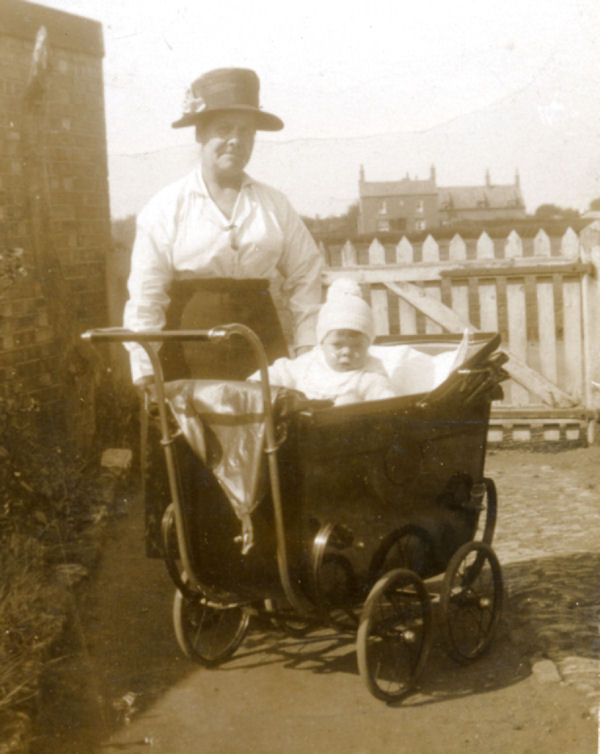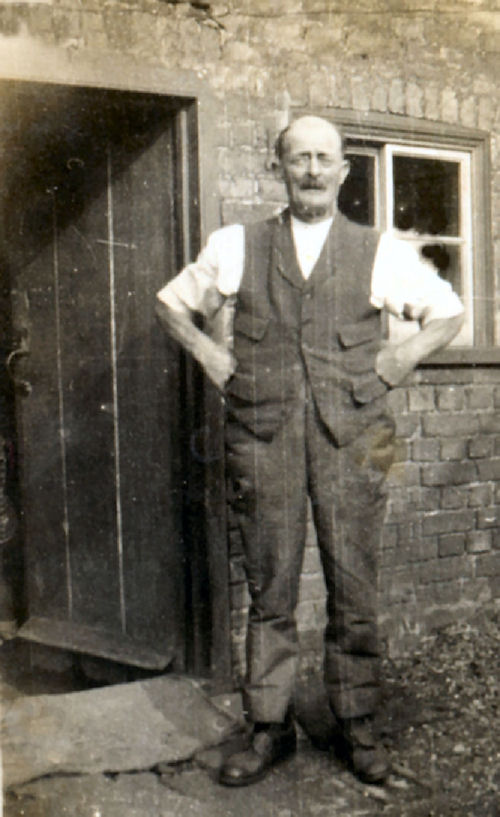

FRED's MEMORY RAMBLE - Part 1
by Fred Sole
This article was originally published in the August 2013 edition of Soul Search, the journal of The Sole Society
Fred Sole, our President, is doing what perhaps all family historians should do and recording his early memories so that future generations of his family will have a record of his childhood, his parents and grandparents. As he says his youth is now history. Excerpts are going to be reproduced in the journal over the next few issues - one of the highlights being a photo of Fred, aged about 2, in a dress! Enjoy.
Introduction
The occasion was a visit by a grand daughter and her family. With no warning great-grand daughter (10) asked, “Grandpa, were you in World War Two?” Surprised, I said “Yes, but only at the end of it because I was too young”. “Hmm”.
Questioning revealed “We are doing World War 2 in history at school” and I realised then that my youth was their history. If I didn’t pass on what I could remember it might all just as well not have happened.
Coincidentally, shortly after, I received from a friend and one-time neighbour a copy of his life recollections ‘as he remembered it’. It reminded me of the family historian’s rule No.1 - “Record what you did, saw, or found for those who follow, because someone, someday, may wish to know those things. There may then be no-one left who can tell them.”
Fortunately we were able to visit Dennis and Rita soon after and he very kindly explained how he had planned and produced his record. I still managed to find problems of my own but his help set me off in the right direction.
This record is not my family history, that exercise has been done already. As its title implies it is merely a ramble through the memories of different parts of my life. Some accounts – dates, names, places etc – may not be perfectly accurate due to memory’s inevitable tricks and some things I may well have forgotten completely.
My intention is to produce only sufficient copies for distribution to interested family members, so a reprint containing any corrections and /or additions may well be in the future.
My thanks go to June and Christine for their sessions of ‘proof reading’, and reminders of things I would have left out due to forgetfulness and their confirmation that the content was ‘fit for purpose’. Any remaining literary failings are mine alone.
I hope you find it interesting and enjoyable.
In the Beginning
This story – but not the memories – began on Saturday 11th June 1927 when I was born at 46, Gracious Street, Whittlesey, Cambridgeshire.
Yes, I was a “Saturday’s Child – works hard for a living” etc!

Fred Sole as a Baby
The house was one of a terrace of eight, four being slightly smaller than the others, and ours was one of the smaller ones. They all contained two rooms downstairs and two above and the front doors opened directly on to the street. A foot passage on one side of the row led to the two communal ‘backyards’ – like the houses, one larger than the other – each of which contained four external brick built ‘wash houses’ and two shared ‘privies’. Luxurious they were not, but of a common standard at the time.
The passage also served the rear of a thatched cottage which was much older and fronted on to Ivy Lane, a footpath from Gracious Street to Claygate. The cottage was the home of a boy a few months older than me who also lived with his grandparents. Roy and I became ‘best mates’ throughout our schooldays.
But for unfortunate circumstances I would have been born at Eastrea, a small village about a mile and a half east of Whittlesey where my mum (Edith May OVERALL) had lived with my dad (Thomas William SOLE – a baker) since their marriage in 1923.
Their first child, my brother Alfred William SOLE was born in 1925 but he died during November 1926 and that upset was followed by the death of my father from bronchitis and septicaemia in January 1927.
The knowledge that her occupancy of their small cottage was ‘tied’ to my dad’s employment, that her income had dropped to zero and that my arrival was not too far away must have been very traumatic for mum.
With no house when dad’s replacement was found and no money to rent something else, the only solution was for the family to ‘rally round the flag’ and help and that is exactly what happened. Mum went back home to live with her mother, Granny OVERALL and sister Blanch Evelyn and eventually my appearance increased the house occupancy to four.

Fred and his Grandmother
Bizarrely it was a re-run of Granny’s own experience when Granddad (John) OVERALL died in 1917, and she and her three daughters had to leave their ‘tied’ cottage in March Fen
Early Memories
Whilst I know that I lived at 46, Gracious Street until my mother married for the second time in 1932, and I have photographs of that time, I have no recollections of those years. Nor can I remember our move to Silverdale bungalow at Kings Delph, 2–3 miles west of Whittlesey on the road to Peterborough (A605).

Mum’s new husband was Richard GABRIEL, an Irishman who had been born at Fermoy, a small town near Cork. With some of his family he had emigrated to Liverpool, England, seeking a better life. Most of them stayed in the Liverpool/Widnes area but Richard made his way south-east and found work at ‘Flettons’ brickyard, Kings Dyke, near Whittlesey.
I can vaguely remember attending the Kings Dyke infants school, about three-quarters of a mile from home and having to walk to and fro each day alone. The river that ran behind our house also ran alongside the road to school until about halfway when it turned sharply under Fields End bridge on its way around the south of Whittlesey.
There was very little motor traffic in those days. All I can remember was the Eastern Counties, Morley’s and Canham’s buses which ran between Whittlesey and Peterborough. I enjoyed hearing one of those behind me because dependent upon who was driving I might get a lift some of the way.

Fred Sole with his first motor car
Much more exciting however was the sound of one of the Foden steam wagons on its way to or from the brickworks. I was never able to boast about getting a lift on one of those.
Even in a lonely place like ours life could become exciting for a 5-6 year old.
An interesting event occurred one morning on my way to school. A strange sound was coming from further up the river so I ran to the bridge and saw what I now know was a steam dredger busily cleaning up the river bed and banks. On my way home he had not moved very far so I ran the rest of the way home to tell mum. She said it might take him a couple of days to reach the back of our house and she was looking forward to a couple of meals of fried eels!
When he did get to our part of the river I had an excellent view of the dredger at work because the river was only a few yards from our garden. And mum got her eels!
Apart from going down with measles whilst we were there, and having to remain indoors with the blinds drawn for what seemed to be an eternity, another excitement I can remember was being outside and seeing a very large policeman parking his bicycle by our front gate.
Obviously he intended visiting us so I ran inside to tell mum. Having seen him through the window she beat me to it and was already opening the front door.
Apparently one of the very rare motorists that used our road had complained at the Whittlesey police station that he had seen a small boy throwing gravel stones on to the Peterborough road creating a puncture hazard for drivers. The only other boy nearby capable of standing unaided was Jim Brown, of two houses away. He was older than me and would have been at school, ergo, it had to be me.
I received the inevitable dressing down and, leaving me utterly mystified and mother happy that nothing serious had occurred, the policeman remounted his bicycle and set off back to the station his job well done. To this day I have no recollection of throwing gravel stones anywhere!
Brother Frank was born in October 1933 and soon after we moved into a cottage in Wades Yard, off Horsegate in Whittlesey. It was no larger than the bungalow but being so central to the town it would have been much more convenient for mum. Also, at the age of seven, I would have had to attend the Whittlesey Junior School in Broad Street, doubling my daily walk. From Horsegate my new school would be ‘just around the corner’. Our immediate neighbours in Wades Yard were Mr. and Mrs. Shadbolt in the neighbouring cottage and, on the other side in the house fronting on to Horsegate, Mr. and Mrs. Savage. The Savage children, Phyllis and Eddie, were older then me. Across the street I can remember Mrs. Eason where I sometimes had lunch if mum was at work, and Mr. Read the shoe mender. I liked taking and fetching jobs to and from him because he would let me stay and watch him at work for a few minutes.
I suspect Wades Yard was a stepping stone towards mum and Rich finding something more satisfactory because after little more than a year we were on the move again. This time the family ‘caravan’ came to rest in Bassenhally Road, Whittlesey, in a converted railway carriage – at least it did for the others (and sister Mary who was on the way).
Converted railway carriages were not uncommon at the time because railway companies happily sold them off cheaply, and for those more affluent they must have made an early ‘buy to rent’ opportunity.
I, on the other hand, was destined for a different location – back to Granny’s house: 46, Gracious Street!
This helped me in several ways. Although aunt Blanche was still living there I had my own bedroom, very few chores to help with and I was back among people I had known. Roy was still with his grandparents, the Anthony’s were still next door and the Hurry and Barnes families were still in the next yard.
Mum’s younger sister Elvins and her husband Herbert (Jack) Searle lived only two houses away in our yard and I was able to resume my visits.

Fred Sole's Grandfather, Alfred Sole